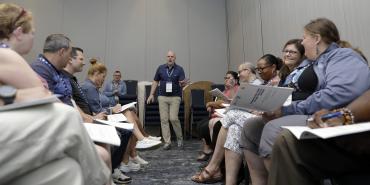To defend and strengthen democracy from misinformation, political polarization and rising authoritarianism, we need knowledgeable and engaged citizens who can communicate civilly across differences. In a Saturday morning AFT TEACH session, “Deepening Civics Skills Through Classroom Dialogue,” participants learned evidence-based classroom discussion strategies that help students critically and respectfully engage with differing opinions.
Classroom dialogue is a powerful tool to develop students’ civic skills—including civic responsibility, public advocacy, media literacy, informed speaking, active listening and reflective questioning. But to be effective, dialogue strategies should be developmentally appropriate, intentionally taught and practiced regularly.
This session offered an overview of four powerful research-based discussion strategies that foster civics skills for students at various stages of development: philosophical chairs, four corners debate, structured academic controversy and Harkness. Then, in a deep dive into philosophical chairs and Harkness, participants learned how these strategies work and tips for implementing them in the classroom.
But first, session presenters and civics educators Tim Krueger, a member of the North Syracuse (N.Y.) Education Association, and Tia Costello, a member of AFT Amesbury (Mass.), emphasized that all classroom discussion requires a safe and brave space where students are respected, complex topics can be analyzed and a peer learning community that encourages risk-taking is established. Discussion norms and procedures should be outlined—and can be co-developed with students—to minimize conflict, protect students from harm and facilitate discussion of controversial or sensitive issues while providing students agency in the classroom.
Philosophical chairs
Philosophical chairs is a highly structured, educator-directed format ideal for middle grades or as a starting point for civil discussion in later grades. In it, students take a stance on a binary issue (e.g., pros and cons of cellphone bans) and support their viewpoint with evidence, using sentence stems and clear procedural rules. This approach teaches critical thinking, active listening and respectful disagreement while giving students experience in developing a personal disposition on a topic and speaking in front of peers. Sentence stems help facilitate smooth discussion and provide scaffolding for students who may be hesitant to speak up, helping them learn to express their opinions, summarize or build on others’ thoughts and shift the conversation if necessary.
Among the practical tips suggested for implementing a philosophical chairs discussion were using graphic organizers to help students organize their thoughts and support their reasoning with evidence and following the discussion with a summative assessment that helps students explore their perspective more deeply. Students who master this strategy can move to more student-led discussion methods (i.e., structured academic controversy and Harkness).
Harkness
Harkness discussions are fluid and student-directed, and they are better suited for students who have already developed foundational dialogue skills. This method emphasizes collaboration to explore open-ended questions (e.g., “What’s the role of student expression in the classroom?”) or solutions to problems identified in a text, media or common experience. Harkness conversations flow from students’ ideas and opinions. Aside from providing guidelines before the discussion or intervening as necessary if students violate discussion norms, educators serve as silent observers, tracking the discussion and the points raised to assess student understanding and guide later instruction.
Harkness can also be scaffolded to encourage participation by using small groups of five to six students, providing sentence stems or 3-2-1 sheets (e.g., three questions, two comments and one personal connection) to get students’ thoughts flowing and prompt conversation, and assigning group roles (i.e., discussion starter, tracker and summarizer). Presenters emphasized that the key to an effective conversation is for educators to step back and allow the awkward silences that can happen as students make connections with the topic and with each other.
For a deeper dive into philosophical chairs and Harkness, see “Teaching in Polarized Times,” which Krueger wrote for the Summer 2024 issue of American Educator. And to schedule in-depth training on civil discussion strategies and civics skills, contact Joanna Braman at jbraman@aft.org.
[Lesley Gonzalez]

